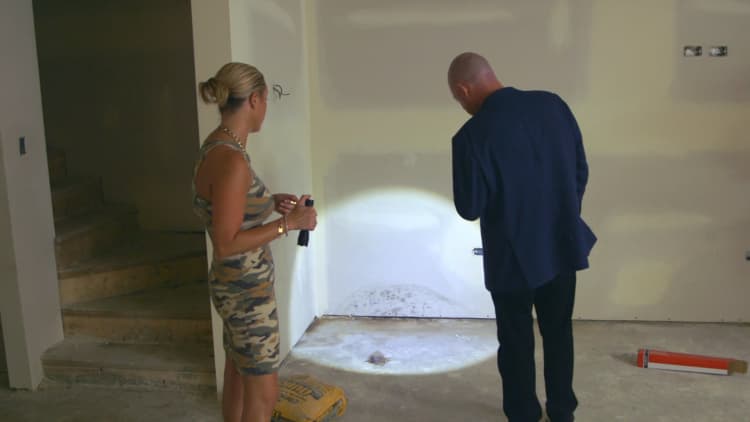Millennials want to buy their own homes — so much so that they, as a group, prioritize it over other life goals such as marriage and children, according to data from Bank of America. But, thanks to a combination of factors including student loans, stagnant wages and the high cost of real estate, many can't afford to buy.
The national median price of homes sold in December was $289,800, according to real estate company Redfin. Of those millennials who are looking to buy, about a third have a budget that's under $200,000, while 17 percent told Clever Real Estate they could only afford a home that's priced below $100,000.
Getting something less expensive because it needs work seems like a functional workaround. That idea tends to appeal to millennials: Over two thirds, or 68 percent, of them would be interested in a fixer-upper, according to a new Clever survey, which polled 1,000 Americans looking to purchase a home.
Buying fixer-uppers are definitely "a way to stretch a budget," Drew Scott, co-host of HGTV's "Property Brothers," tells CNBC Make It: "You're not going to pay that maximum price for all the work someone else did, you'll put that sweat equity in yourself."
That said, first-time buyers especially should be cautious before jumping into a major home overhaul. Don't assume a fixer-upper will end up being the cheapest route. The Scotts say they've seen lots of owners buy fixer-uppers and end up with regrets, usually because they weren't properly prepared for the work and costs that go into renovations, not to mention the aggravation.
Data backs them up. As many as one in three people say they regret their home remodeling projects, according to a survey conducted on behalf of Scyon Walls. The same survey found that one in four renovation projects go over budget, while about 20 percent take longer than expected.
"Almost everything stems from a lack of education — whether it's the education of what financial products are best for you, or education on what products to put in your home for renovation, or how to do the renovation," Drew tells CNBC Make It.
So if you are going to undertake renovating a fixer-upper, Drew and Jonathan have a few tips on how to do it right and avoid regrets.
1. Budget appropriately
Regardless of the size and scope of the renovation your new home needs, you should be aware of what you're getting into before making an offer. That means making sure you've budgeted for renovation costs from the outset.
Overall, about four in 10 millennial home-buyers felt they made poor financial choices when it came to purchasing their home and ended up spending too much, according to a 2018 survey of property owners aged 21-34 by Bank of the West. And one in five said they were frustrated by damages they found after moving in.
The average homeowner typically spends just under $43,000 to remodel multiple rooms in their home, according to Home Advisor. Areas like the kitchen and bathroom can be the biggest projects. The cost of an average kitchen renovation is about $20,500, while a bathroom usually runs between $6,000 and $14,000.
Setbacks and extra, unanticipated costs can cause grief for home-buyers who haven't budgeted for them. That's why design site FreshHome recommends adding 15-20 percent on top of any estimate.
2. Spend wisely
No matter the project, it's important to spend your money wisely. To that end, the Scotts say it's important to keep the function and flow of a room in mind when renovating.
"Don't just think of the aesthetics," Drew says. A lot of first-time home-buyers prioritize the details of a room like a beautiful light fixture, or the counter-tops, or the furniture. Instead, spend on ways that will maximize the use of the space, he says.
Owners frequently run into this problem when they try to remodel a kitchen. "People say, 'I want to add value to my house, I want to have a beautiful kitchen,' and they have some closed-in, dated layout," Drew says. But if you tear out old cabinets and put in new ones in the same bad layout, "then all you have is a new crappy kitchen," he says.

If this is your first time remodeling, the best advice is to start on smaller projects first and build your way up. The Scotts say the bedroom is usually the simplest place to begin because you don't usually have expensive fixtures or plumbing, where the hourly cost of repairs can range from $45 to $150.
The other key to spending your money wisely is to be realistic about who will be living in the home.
If you have three kids and four dogs, you're going to wear down real hardwood floors, Jonathan says. So instead, opt for single-board laminate floors. They can be indistinguishable from real wood, and laminate is much more likely to last, he says.
"Every room is a little different," Jonathan says, but don't lose sight of how the renovations will actually solve your problem and address your needs.
Don't miss: Property Brothers: Don't make these 3 renovation mistakes that homeowners regret
Like this story? Subscribe to CNBC Make It on YouTube!



